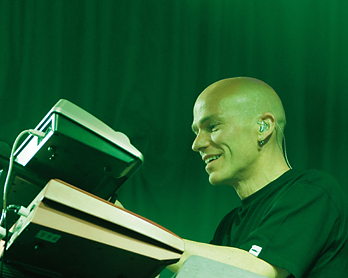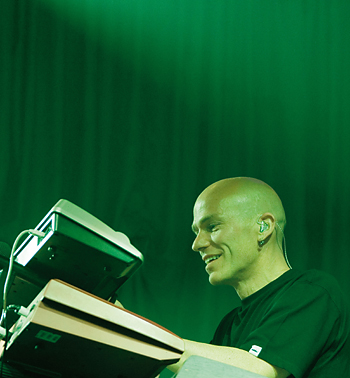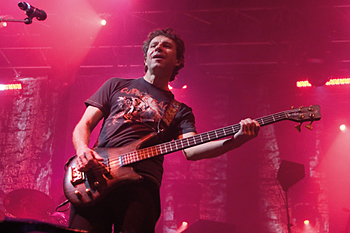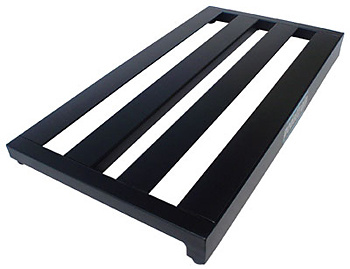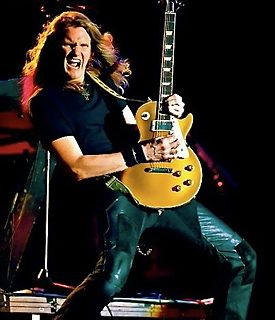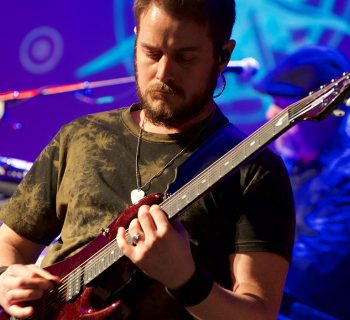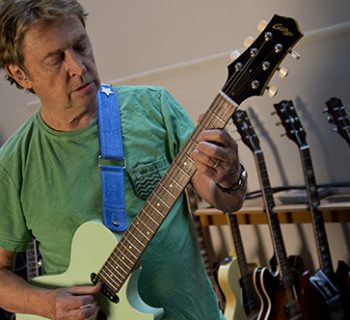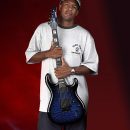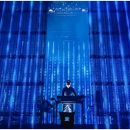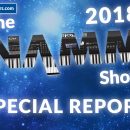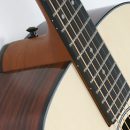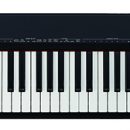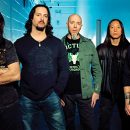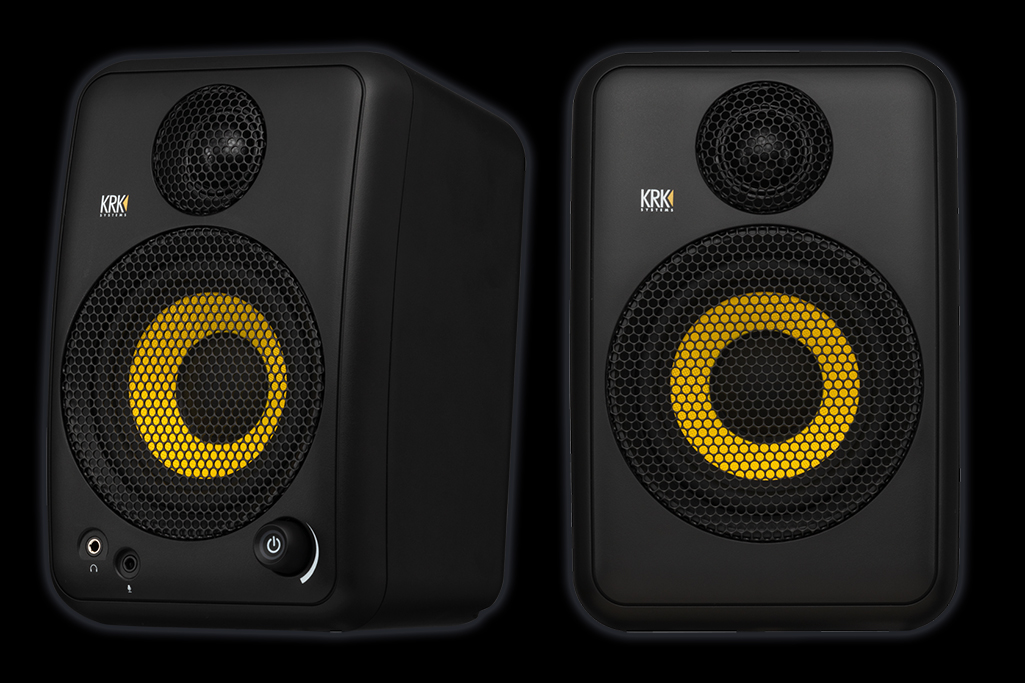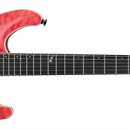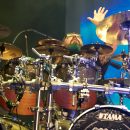Mark Kelly is one of the finest keyboard players in all of rockdom. A man in command of keyboard technology, Mark is one of those players who really knows how to play for the song. Whether playing piano, supplying swirling atmospheric pads to establish a mood, or playing spacey lead melody lines, he always seems to have just the right sound and just the right feel for the music at hand.
While other keyboard players in the annals of progressive rock have demonstrated flashier keyboard pyrotechnics, Mark impresses us with his command of dynamics, sound sculpting, and uncompromising songwriting.
Striking a delicate balance with guitarist Steve Rothery, Mark knows how to give keyboards their space in a song, and keyboard players unfamiliar with his work would be wise to jump in and start listening. There’s a lot to discover.
Note: If you jumped into this interview directly, don't miss our extensive Marillion band interview and feature story here.
"We can’t really sound like anything else. We just sound like Marillion."
MPc: It’s been nearly 25 years since you started playing with Marillion, and with the release of the 14th studio album, Somewhere Else, it seems that you’re continuing to evolve musically and sonically as a band. Tell us about the making of the new record.
Mark: It’s always a bit of the unknown when we start a new project. When we come back off a tour, it’s a little bit of “Well what are we going to do now?” After Marbles, we felt like we had done something really special with that album, and I think we were a bit daunted by the prospect of having to try to do something to beat that. And you know, you shouldn’t really be thinking like that, but the thought does cross your mind that people are going to make comparisons. We got off to a bit of a false start back in 2005 because we didn’t really get a huge amount of stuff done that year. It wasn’t until the beginning of 2006 when we started working with Mike Hunter that it really started to come together.
You know, we’ve had different producers over the years. One of the guys we went back to again and again is Dave Meegan. Dave produced four of our albums – four of our most liked albums by our fans, not counting the Fish years. I think with Mike there was a slow transition to working with him because he was the assistant engineer on Brave when Dave was producing, and he did a few other bits and pieces with us, and then with Marbles, he ended up mixing about half the album. We really liked his approach to mixing, so it just seemed like a natural progression to ask him to produce the next album.
It was quite different than working with Dave. Mike is much more of a musician; Dave is more of a traditional producer – he sits behind the desk, twiddles the knobs, and does that engineering production thing, whereas Mike gets more involved with the music, and he was a bit nervous about that at first. He’d come in and say, “I’ve done this bit of bass guitar, I’ve done this bit of keyboards… don’t think I’m trying to join the band or anything.” If he has an idea, rather than trying to ask us to interpret it, he just stuck a rough version of it down by himself playing a bit on piano or something. It was very interesting to have someone who is not normally making music with the band come up with some musical suggestions, so that was a bit of a fresh approach to things. But the writing process and recording process was similar to how we’ve worked in the past. We start out jamming, and the best of the jams would become the beginnings of songs, and they’d be developed, and arrangements would be worked out, and eventually we’d start recording.
MPc: For many rock bands, adding a talented keyboardist turns their sound from rock into pop. Marillion has managed to strike a great balance between the use of guitars and synthesizers, though. How do you maintain the equilibrium between you and Steve Rothery? Do you make a conscious effort to keep things so well balanced?
Mark: Not at all. It comes down to what our taste is, really. People sometimes say to me, “Why don’t you do more keyboard solos?” or they ask questions about what I play. For me it comes down to this: you hear what’s going on and come up with an idea. But what you play and the sounds you use is just down to what you personally think sounds good. There’s never any real discussion about that. It’s just what comes naturally to us. Maybe we’ve just got a chemistry that works between the guitars and keyboards. I’ve never really thought about it. We can’t really sound like anything else. We just sound like Marillion.
And Steve Rothery, his guitar solos, I think, are really exceptional most of the time. I’d just as soon hear him play a solo on the guitar than do one myself on the keyboards. It’s one of those things again where we just sort of write whatever the song needs. It’s never a case of “Well how many solos have you had on this album? It’s time for me to have a solo.”
MPc: There are four different groupings of sounds that you make use of – piano, organ, lead sounds, and synth/pad stuff. Let’s talk about these sounds and how your keyboard rig evolved over the years.
Mark: In terms of the sounds, you’ve pretty much summed it up for me. Piano is one of those things that is just great. If you have a great piano or sampled piano, you use it for certain things and it just sounds great. The organ does as well – the Hammond organ… it’s one of those timeless, great sounds. The Mellotron, electric piano, and then the realm of strings or pad sounds and synth/special effect sounds. I always come back to piano, organ, strings, and then come up with stuff that is new, where I spend a lot of time [on sound design]. I don’t want it to just be a piano and organ.
One of the things I’ve gotten into recently, that I used quite a lot of on this album, is putting the keyboards through a plug-in called Guitar Rig 2, which is of course intended for guitar. Distortions, echoes, and various phasers and flangers… the quality of the distortion is very good and works brilliantly on things like pianos, organs, and electric pianos when put through them.
The second half of “The Wound” – the main keyboard part on that is run through that effect. The whole of “The Last Century For Man,” the keyboards on that sound more guitar-ish than like keyboards, really. It’s electric piano through Guitar Rig 2 with a fairly distorted sound. That was something I hadn’t really explored before.
“You have guitar all over a song and nobody is going to go ‘Too much guitar,’ but if you have too much Minimoog on a song they will go ‘Hmmm… too much Minimoog.’”
Another thing is that I’m now using almost exclusively VST instruments. This album is a little bit of a departure back to the old days, though recording-wise, because Mike Hunter was very much in favor of “If you can play a real instrument, I’d rather you play a real instrument. If we want a real piano sound, can you use a real piano.”
MPc: Do you record with real pianos?
Mark: I do. The grand piano in our studio is not brilliant – it’s just OK. It has a sound of its own, shall we say. I’ve been using Synthogy’s Ivory, which is a really excellent VST piano. It has a huge sample space and it feels good to play.
Especially for live, the host program I put VST instruments through is a program called Forte, from Brain Spawn. They’ve been very helpful because I’m one of their high-profile customers. So they’re quite accommodating.
I’m quite happy with the software and how it’s working. On the first tour with the Forte rig, things were a bit touch and go for a bit because I was running beta versions of things and it was quite scary. The Marbles tour was the first time I used it, and I had the old rig with the old songs programmed into that, and the new rig was just for the Marbles stuff, but since then I’ve gradually got rid of the old stuff. I’ve got three keyboards on stage, now and two of them are just MIDI controllers.
I have the [Roland] A90. I have got an Oberheim MC-3000 that doesn’t make any sound of its own – just for MIDI control. The A90 has some built-in sounds, so I have it as a safety in case the computer was to fall over halfway through the gig. I could literally just pull up a piano/string/organ patch and I’ve got something I can play in the event of a computer failure. I’ve had that for ten years or more, I think.
Then I’ve got the Korg Karma for quite a few things. It’s got some good sounds. I’ve used it quite extensively on the last couple of albums. And I have an M-Audio controller.
MPc: Your lead solo sounds have great personality. They rarely sound like just a basic Minimoog.
Mark: I still have an old Minimoog kicking around, but it’s rare that I would just use a recognizable Minimoog sound. It’s hard to use a Minimoog solo sound and not have it sound dated. It’s one of those things that when you play it, it just does something to a song. The Mellotron is similar to that. The effect it has on a song is more than just the sound. It evokes lots of other things, which sometimes you want, and if you don’t want that, sometimes you just can’t use it. Like piano, really. Nobody would bat an eyelid at piano, or guitar. You have guitar all over a song and nobody is going to go “Too much guitar,” but if you have too much Minimoog on a song they will go “Hmmm… too much Minimoog.” Certain instrument sounds are just part of what people expect, and there’s other things like the Minimoog where as soon as you play it, it takes you someplace, but if you don’t want to be there you have to leave it alone.
I’m constantly looking out for new sounds. When we’re writing or recording, if I come across a great sound I’ll save it and remember it. And I’ll have in my head sounds that I was excited about over the past few months. That’s one of the good things about the computer. If you create a complicated patch with different VST instruments, you only have to hit one button to save the whole thing as it is and to recall it is a piece of cake, as long as you remember what you called it and where you saved it. (laughing)
“Hearing Rick Wakeman play keyboards; I wanted to play keyboards. That was it – end of story.”
MPc: Do you do much programming or sound design?
Mark: Quite a bit. A lot of the time when we’re writing, part of the process of jamming, while people are jamming, I might just be messing with sounds and trying layering things with different combinations of sounds and effects. Instantly if you have a great sound it can be quite inspiring. You just start playing it and music happens. It’s effortless. Whereas if you’ve got something uninspiring to listen to, it’s much more difficult to get excited by what you’re playing.
MPc: The Karma is great for just hitting a few keys and getting inspiring sounds.
Mark: Yeah, it is. It’s got that “Instant Gratification” button. (laughing) It can become a trap though, where you end up sounding like everybody else if you’re not careful. I tend to keep away from the pre-programmed Karma things. You’ve only got to hit a certain key and it sounds like other peoples songs. You hit a key and suddenly it sounds like Pink Floyd or Steely Dan or something. You just have to use it in a creative way.
MPc: Let’s talk about Mr. Blinky and how you can pull off many layers of sound effects, sequences, and (possibly) backing tracks live.
Mark: (Laughing) Well it’s something that’s sort of evolved. We never used tapes. Back in the old days, we always refused to use tapes, usually because we just want to play. Ian always refused to wear headphones so we never had a click track. We never got into that whole thing of tapes running or CDs or DATs or sequences because Ian refused to play to them.
It started with a few odd sound effects I would trigger, and there would be a bit of backing vocals or something that I need to trigger. But then there’d be something I had to trigger that might be a bit longer than a second or two and might need to be in time, so the track would need to be played at roughly the speed that we played on the album.
Steve Rothery came into the studio one day with this flashing light metronome called the MIDI Metro, which was a bit of a pun on the car called the Mini Metro, and it seemed like a good idea because you could use it as a guide to be in the ballpark rather than having to play to it. So Ian nicknamed it Mr. Blinky, and we went from there.
Now we’ve gotten to the point where I’m hitting keys that will play an entire stem of a drum loop or something. On a couple of songs, we have to play the song the right number of bars for triggers to happen in the right place, but for most songs, if Steve starts singing two bars later than he usually does it wouldn’t be the end of the world. If we played it too fast, as long as we’re not ridiculously too fast, the triggers will be played at the right time.
MPc: Who were some of the keyboard players that influenced you in the early years, and what was it that first drew you into synthesizers?
Mark: Unquestionably one name – Rick Wakeman. I was fourteen or fifteen and heard “Journey to the Center of the Earth,” and was absolutely bowled over. I couldn’t get enough of Rick Wakeman’s keyboard playing, and Yes. Then it was Pink Floyd and Genesis. But hearing Rick Wakeman play keyboards; I wanted to play keyboards. That was it – end of story.
So I bought this really crappy organ and had a problem with it, and had this guy out to repair it for me, and I said “I want to make sounds like this!” [played some Yes music for him] and he said “You’re not gonna’ get sounds like this outta’ that!” and then he says “Come over here” and he showed me… he had a Minimoog in the back of his van. And I was drooling.
I met Rick Wakeman a few years ago at a Travis gig. I was backstage, and Rick Wakeman’s son Adam was playing keyboards for Travis, so Rick was there. And I was standing with Adam and Rick, and I told Rick “I’ve been a total fan. You’re the reason I started playing keyboards” and Adam turns to me and says “And you’re the reason I started playing keyboards. I wasn’t playing Dad’s stuff – I was playing your stuff!” That was quite a nice moment.
MPc: Are there any keyboard players or bands today that you find inspirational, or just enjoyable to listen to?
Mark: I don’t tend to go for keyboard players music. I’m more into songs and bands and singers rather than keyboard players. I haven’t found anything in the last couple of years that I’m particularly excited about. Although there is a band called Public Symphony that is going to be supporting us on a couple of London shows. They sent us a CD – we did a thing on the website to “support the band,” and I heard it and thought it was really good. I like them. They’re a bit Floyd-ish. Now there’s a plug for an up-and-coming band! I like stuff like Elbow, and Radiohead, Coldplay, Rufus Wainwright… nothing too out of the ordinary.
I’m really a bit disappointed. The last few years there’s very little going on that I found particularly exciting, or that had a lasting impression. So what are you listening to? Give us something really cool that you’ve heard.
MPc: I usually tell people, “Do you know Marillion?” (laughing)
Mark: Right, well that’s really not going to help me! (laughing)

